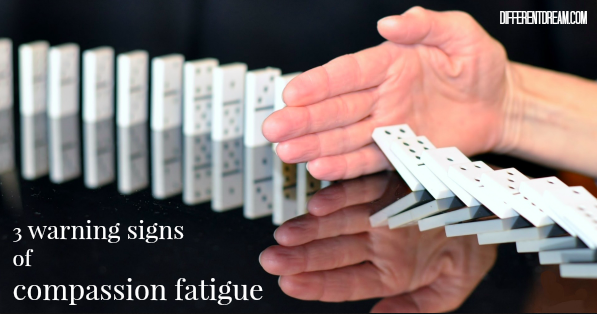3 Signs You Are a Caregiver with Compassion Fatigue

Could you be a caregiver with compassion fatigue, or as it’s also known, secondary trauma? That’s a question posed at The Engage Conference sponsored by 99 Balloons on April 14, 2018. The topic first arose on the drive to the conference and again during the Mom’s Panel breakout session. Moms talked about their love for their children, as well as their daily challenges and duties, which make it hard for them to leave their children.
As I listened, the lightbulb in my brain switched on. The emotions the moms were sharing were symptomatic of a caregiver with compassion fatigue. After the conference, I distilled their descriptions into the following 3 warning signs.
- The caregiver feels trapped and overwhelmed, never able to leave the child because there’s no one else willing or able to provide care. Time constraints, schedules, money worries, and distance make it impossible to get away. People, even family and good friends who truly want to help, don’t understand the burdens of caregiving. Caregivers in this situation worry that if they tell someone what their life is really like, they’ll be labeled as whiners and complainers.
- The caregiver feels indispensable. This caregiver may have more resources and a better support system than described in #1, but doesn’t tap into them because no one else can care for their child as well as they do. While it is true that loving parents know their children better than anyone else and do provide the best care, plenty of other people can provide good care. Good enough care so parents can get away and practice self-care, attend to their children’s needs, and work on a marriage.
- The caregiver must maintain complete control. This warning sign is similar to #2, in which the caregiver’s primary concern is the level of care the child receives. But in this case, the primary concern is how releasing control impacts the caregiver. For example, the caregiver knows that after someone else watches their child, the child will wet the bed, aberrant behaviors will increase, or the child won’t sleep, creating a mess for the caregiver. Therefore, the caregiver creates a strict, inflexible routine in order to maintain complete control, fearful that if one domino falls, the whole world will come crashing down.
If one or more of the warning signs describes you or a caregiver you love, you need to let people into your life by asking for help, taking advantages of programs that provide caregiving support, and training friends and family to care for your child so you can take a break. You may also benefit from a professional counselor or therapist. Your child needs a physically and mentally healthy caregiver, so take the steps necessary to be the person for your child.
Do you like what you see at DifferentDream.com? You can receive more great content by subscribing to the quarterly Different Dream newsletter and signing up for the daily RSS feed delivered to your email inbox. You can sign up for the first in the pop up box and the second at the bottom of this page.
By Jolene
Jolene Philo is a published author, speaker, wife, and mother of a son with special needs.
Subscribe for Updates from Jolene
Related Posts
How the Christmas Story is a Special Needs Story
Guest blogger Mark Arnold explains how the Christmas story is a special needs story as he presents each aspect of the birth of Jesus.
What a Difference a Decade Makes!
Guest blogger Janae Copeland gives readers insight into her family’s EA/TEF journey from the vantage point of her daughter’s 11th birthday.
Parenting a Child with Disabilities Isn’t the Grief Olympics
Guest blogger Laura Spiegel explains why parenting a child with disabilities isn’t the grief Olympics. You don’t have to win at grieving.






0 Comments